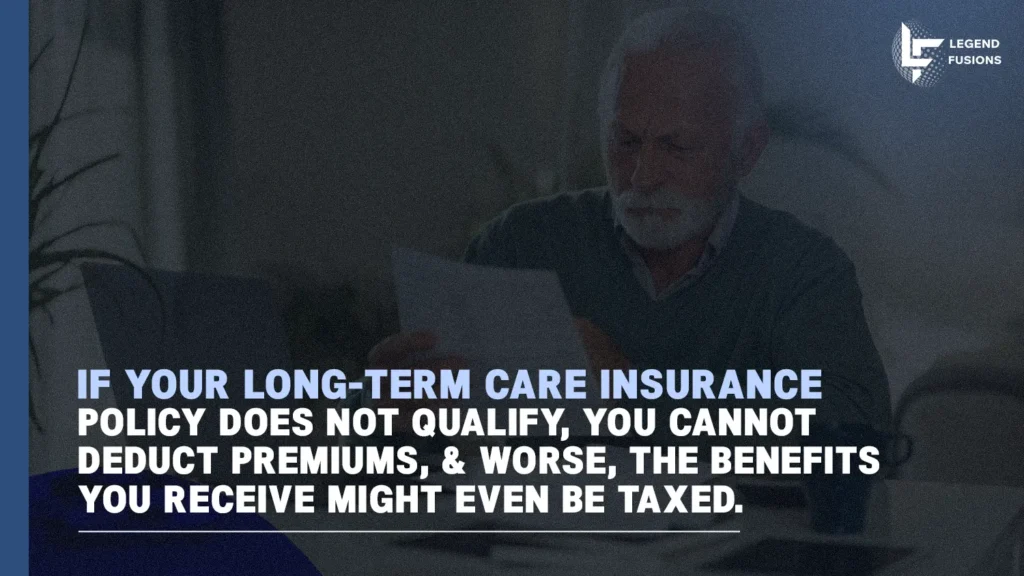With medicinal and healthcare advancements come longer life expectancy, but it also implies the pressing need to get a long-term care insurance policy. We need to face reality: long-term care expenses can quickly deplete our savings, plus taxes.
Yes, your policy payments are taxed, unfortunately; woeful as it adds to your overall expenses. But here’s good news—if it follows HIPAA rules, you get tax benefits. This blog explores all the long term care tax benefits you can get and how they work.
Contents
What is Long Term Care Tax?
Long term care tax is all about how the IRS (and state tax authorities) treat the money you pay for long-term care insurance premiums and the benefits you get back.
It is a special part of taxation designed to encourage you to plan for future care needs, as you get tax benefits if your policy meets certain rules. These can significantly help ease your financial burden for future long-term care expenses.
Is Long Term Care Tax Deductible?
Yes, long-term care insurance premiums can be tax deductible as medical expenses on federal tax returns. These premiums are treated like medical expenses when you itemize your deductions. However, there are a couple of rules:
- Income Rule – your total medical expenses (including your long term care premiums) must be more than 7.5% of your Adjusted Gross Income (AGI). You can only deduct the amount above this limit.
- Age Limits – the Internal Revenue Service sets specific annual limits on how much you can deduct, and these limits go up as you get older.
Another way is tax-free benefits, wherein the payment from your policy becomes tax-free. This means more money going directly into your care. Typically, you need to be certified as chronically ill to receive these tax-free benefits.
Is Your Policy Qualified for Tax Benefits?
Your long-term care insurance policy needs to meet specific rules set by the IRS under a law called HIPAA (Health Insurance Portability and Accountability Act) to get qualified for the tax benefits.
HIPAA outlines how a long-term care insurance policy can be considered qualified:
- Only covering qualified long-term care services (e.g., strictly for help with daily living activities, personal care, or skilled nursing care).
- Not covering expenses covered by Medicare (no duplicate coverage).
- Guaranteed renewability (the policyholder has the right to renew the policy).
- No cash surrender value (no cash value that you can withdraw).
- No specific benefits for diseases (only functional limitations, not specific illnesses).
This “qualified” status is everything. If your policy is not qualified, you will not get any of the tax benefits (more below). The whole point of these tax provisions is to help you manage long-term care expenses, so be sure to aim for a qualified life insurance policy

How Do Long Term Care Tax Benefits Work?
Long-term care tax advantages work as follows:
1. Tax Breaks When You Pay Premiums
Your premiums are counted as medical expenses when you itemize deductions on your tax returns (typically on Schedule A of your Form 1040). The exact deduction amount depends on your age and income.
2. Tax-Free Benefits When You Receive Care
When your qualified policy starts paying, those payments are generally tax-free. Say, your policy pays you a daily or per diem benefit; that money comes directly to you without being taxed. This ensures more of your funds go straight to covering your long-term care expenses and preserving your wealth.
Other Tax Benefit: State-Specific Payroll Taxes
Besides federal benefits, some states also have their own ways to fund long-term care, often through mandatory payroll tax initiatives. For instance, Washington State pioneered this with its optional WA Cares Fund, a payroll tax that results in a direct deduction from your paycheck.
States like California and New York are also exploring similar models. These state-specific rules impact your finances and care options, so be sure to stay informed about your long term care tax states obligations. This helps you avoid unnecessary withholding and maximize refunds.
Tax-Free Alternative: Viatical Settlements
A viatical settlement allows terminally ill individuals to sell their life insurance policy for a tax-free cash sum. While not directly long-term care insurance, these funds can be a crucial, tax-free source of money to cover long-term care needs.
How to Pay LTC Premiums Tax-Efficiently
Consider these strategies if you are self-employed or have an HSA:
• For Business Owners (Self-Employed/Partners)
You can often deduct your long-term care insurance premiums more easily than individuals, sometimes without typical income limits.
• For Corporations
If a company pays employee long-term care insurance, it is usually fully deductible for the business, and the employee typically receives the benefit tax-free.
• Using Your HSA
You can use tax-free money from your Health Savings Account (HSA) to pay for qualified long-term care insurance premiums, essentially paying with pre-tax dollars for a significant tax advantage.
Frequently Asked Questions
No, long-term care insurance premiums are tax deductible as medical expenses only if you itemize.
Generally, no. Benefits from a qualified long-term care insurance policy are usually received tax-free, up to a certain per diem limit set by the IRS, as long as the policyholder is chronically ill and receiving care.
Yes, you can use tax-free distributions from your Health Savings Account (HSA) to reimburse yourself for qualified long-term care insurance premiums. These payments are subject to the same age-based IRS limits that apply to tax deductibility.
Proper long-term care insurance can help protect your assets from being depleted to qualify for Medicaid. This allows you to receive care without first “spending down” most of your savings, preserving your wealth and inheritance.
Yes, businesses often get favorable tax breaks. Self-employed individuals can deduct eligible premiums more easily, and corporations can typically deduct premiums paid for employees as a business expense, usually without it being taxable income to the employee.
Get Tax-Efficient Long-Term Care Plan
For personalized guidance and to ensure your long-term care plan aligns perfectly with your financial goals, reach out to the experts at Legend Fusions. We specialize in navigating these complex tax areas, especially long term care tax, helping you make informed decisions that protect your wealth and ensure a secure future. Contact us today.
Reviewed by:

Hira Asif
Hira Asif, Client Manager (US) at Legend Fusions, brings over 11 years of tax expertise, including 8 years with Ernst & Young. Her work focuses on tax advisory, compliance, and planning for individuals, partnerships, and private equity funds. With a deep knowledge of federal, state, and local tax regulations, Hira is skilled in identifying tax planning opportunities and reviewing corporate and partnership tax returns to optimize compliance and reduce exposures.

